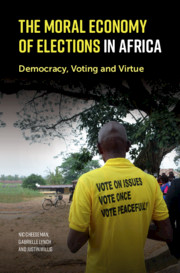Book contents
- The Moral Economy of Elections in Africa
- The Moral Economy of Elections in Africa
- Copyright page
- Dedication
- Contents
- Figures
- Tables
- Acknowledgements
- Abbreviations and Glossary
- Introduction: Writing African Elections
- 1 Towards a Moral Economy of Elections in Africa
- 2 Elections, States and Citizens
- Part I Promoting Civic Virtue
- 3 National Exercises
- 4 The Eyes of the World Are upon Us
- 5 Creating Democrats
- Part II The Moral Economy in Action
- Appendix 1: Research Methods
- Bibliography
- Index
3 - National Exercises
Making States and Citizens through the Ballot
from Part I - Promoting Civic Virtue
Published online by Cambridge University Press: 15 December 2020
- The Moral Economy of Elections in Africa
- The Moral Economy of Elections in Africa
- Copyright page
- Dedication
- Contents
- Figures
- Tables
- Acknowledgements
- Abbreviations and Glossary
- Introduction: Writing African Elections
- 1 Towards a Moral Economy of Elections in Africa
- 2 Elections, States and Citizens
- Part I Promoting Civic Virtue
- 3 National Exercises
- 4 The Eyes of the World Are upon Us
- 5 Creating Democrats
- Part II The Moral Economy in Action
- Appendix 1: Research Methods
- Bibliography
- Index
Summary
This chapter traces the history of election organization in Ghana, Kenya, and Uganda. It identifies a common pattern of technical and institutional elaboration, driven by a desire to produce procedurally perfect elections through the combination of new technologies and more professional personnel. The chapter argues that this elaboration has come at a significant financial cost, but that it has had some effect in shaping the subjectivities of those involved as electoral officials and of voters. Yet this determined attempt to promote civic virtue through electoral performance – which has attracted much support from donors - has always been challenged by forms of patrimonial claims-making that persistently intrude into the imagined order of the electoral process. Intimidation and bribery, as well as pursuit of particular interest, drive malpractice; logistical failures and errors encourage the suspicion that others may not follow the rules. Ghana, Kenya and Uganda may seem to offer different stories: Ghana’s Electoral Commission attracts international praise, while Uganda’s has been heavily criticised. Yet that difference may be overstated: there is widespread suspicion of the electoral management bodies in all three countries. The production of citizens and state through electoral performance may be powerful, but it is very far from unquestioned.
Keywords
- Type
- Chapter
- Information
- The Moral Economy of Elections in AfricaDemocracy, Voting and Virtue, pp. 109 - 141Publisher: Cambridge University PressPrint publication year: 2021

